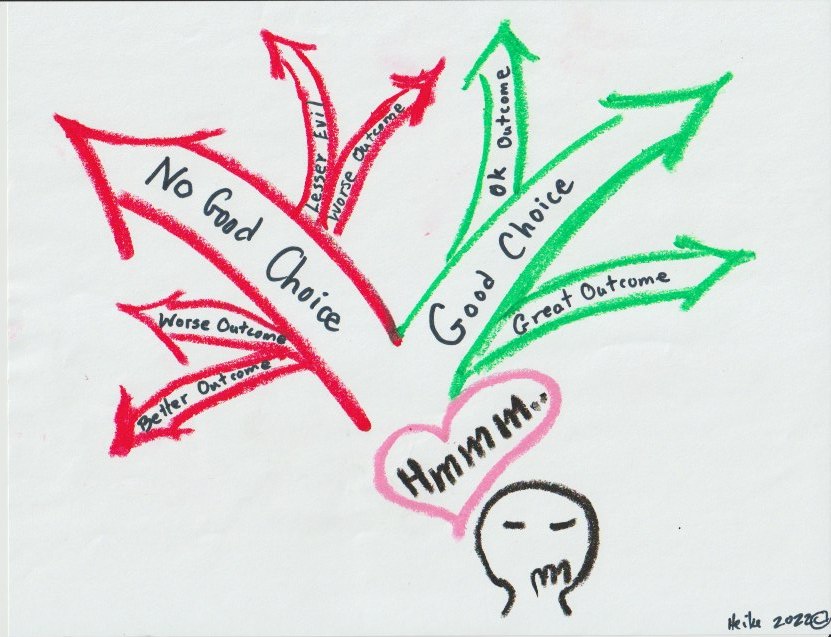When There are No “Good” Choices

When There Are No “Good” Choices
There comes a point in time for all of us when the decision we must make is between two less than stellar choices. It’s a place where the decision becomes about minimizing risk and aiming for an outcome that is ‘less’ awful. It’s a place where none of the options are ones we would willingly choose. It’s a place where there no “good” choices available to us. Hopefully, there is one choice that meets more of our criteria than the others. However, sometimes the number of criteria is reduced to one: the choice which might create more comfort or do less harm. Sometimes this is the best outcome that we can hope for. This is the place where a ‘better choice’ is all that’s possible.
It is daunting to make these decisions for oneself. For caregivers and those holding power of attorneys, this pandemic has added another layer of complexity to an already complicated process.
I’ve walked in the shoes of a caregiver. I’ve faltered. I’ve fallen. I’ve crumbled. I’ve had regret and I’ve learned a few things along the way about what I need to make a better choice.
How To Make A Better Choice
Sometimes making a ‘better choice’ feels like choosing a lesser evil. Therefore, when we must make these types of choices, we need to be in the best possible space that we can be, physically, mentally, and emotionally. This is not always easy, but it is essential. These are a few of the things that I’ve found helpful.
- Find a quiet spot. Breathe. And then run through the list of questions you must answer for yourself before you feel comfortable deciding. Note: in a crisis this may not be an option. However, a few minutes delay is often not an issue. Take it.
- Be kind to yourself. This is a hard thing to do. No one wants to make these types of decisions—not for themselves and most certainly not on behalf of others.
- Be at peace with whatever decision you make. Know that you make it from love and that you have been tasked not only with making the best decision for your loved one, but for yourself and for everyone involved. This can be daunting. If it is, repeat 1. And 2. Know that ‘better choices’ are also best choices.
- Accept that making ‘better choices’ when no ‘good’ choice is available is a part of life- even if it sucks and is painful.
- It’s equally important to accept that though the better choice may not be our ideal choice, sometimes the better choice is our best option. Know this, accept this, and move towards what calls to you next.
Caring For Others Begins With Self-care
It’s easy to lose oneself in a crisis. It’s important that we don’t. In a culture where caregiving stills falls primarily to women, self-sacrifice is too often the norm. This needs to change for everyone’s sake. Self-sacrifice is never a lesser evil or better choice.
This is difficult when we believe that the needs of others are greater than our own. When we begin to think like this, we must remember to step back and begin by asking the question “What do I need in order to make the best possible decision here- given the current circumstances?” This is tremendously challenging, and I have failed to do this for myself in the past. Consequently, I have also paid the price for doing so. It is one thing to consciously decide to pay the price than to unconsciously do so. This too I have learned through experience.
When we check in with ourselves to make sure we are in the best possible place, mentally, physically, and emotionally to make these decisions, we consciously give ourselves the opportunity to double check that we are making a choice we can live with. When we make decisions in this manner, it makes it easier to live with the outcome of our decisions- whatever they may be. This does not make these decisions any less gruelling. Hopefully, it helps us to accept that balancing our own wellbeing with that of a loved one may be one of life’s no ‘good’ choices decisions. In some situations, a better choice is the best we can hope for and this is always good enough.
A Closing Thought
Let us remember to be a little more compassionate towards those in our lives who are working their way through the making of ‘no good’ choices. It isn’t easy. And it is likely something all of us at one time or another will have to do. Making ‘no good’ choices is a part of what it means to be an adult and to love others.
Stay well,
Heike
************
Buy Heike’s book “Grief is…” here at: Amazon Indigo Barnes & Noble Apple Books
To receive this blog in your inbox sign up here
To learn more about Heike (Author: “Grief is… thoughts on loss, struggle and new beginnings click here
This so applies to my situation as a care partner for my husband. Thank you for articulating this very difficult decision.
You’re very welcome. I’m glad if this helps make these difficult decisions a little easier for you. It’s a hard space. Be kind to yourself too. Stay well, Heike